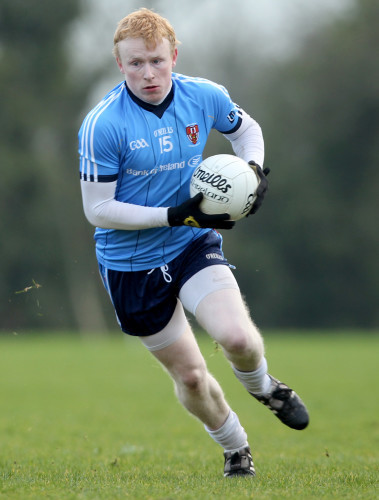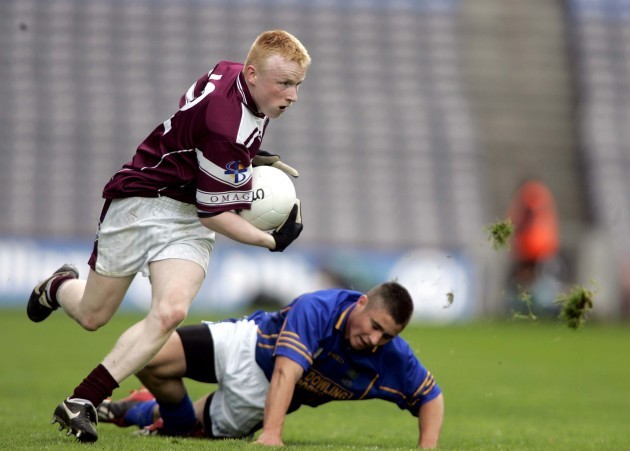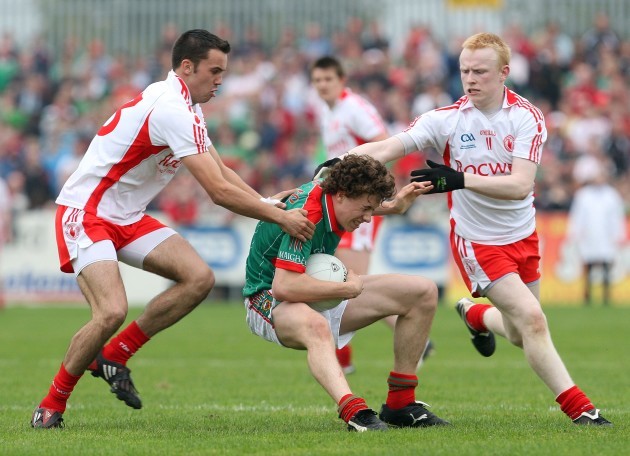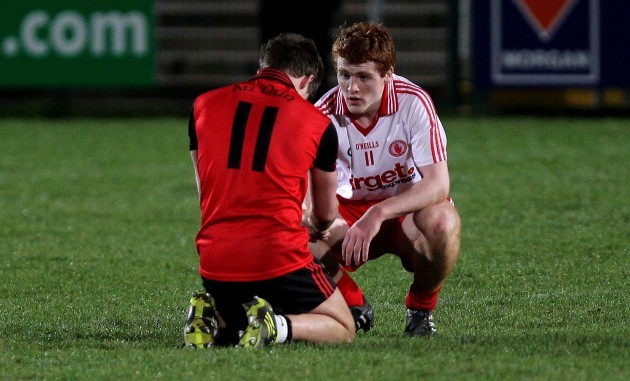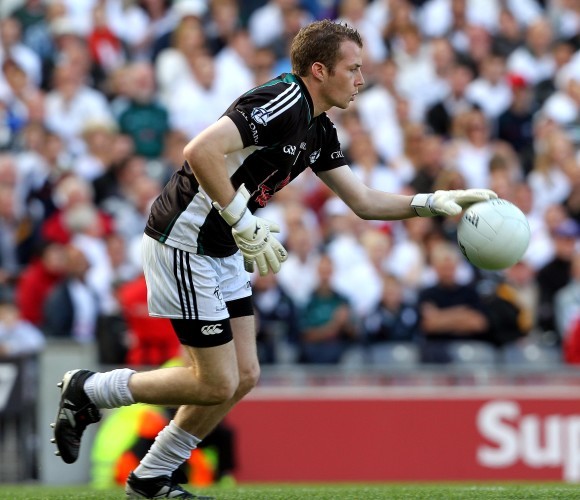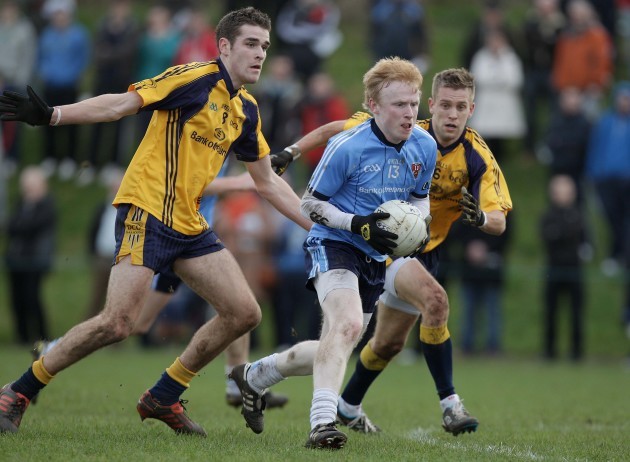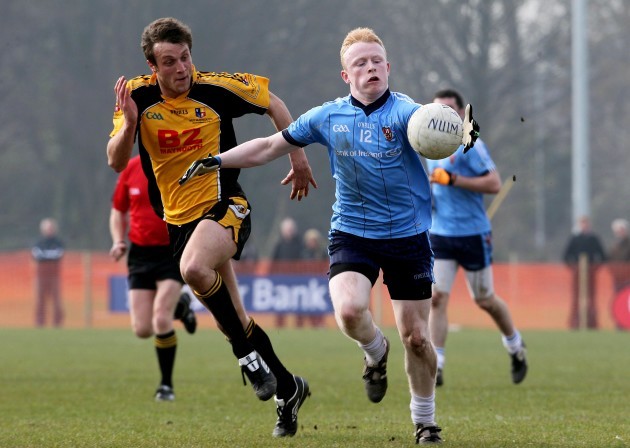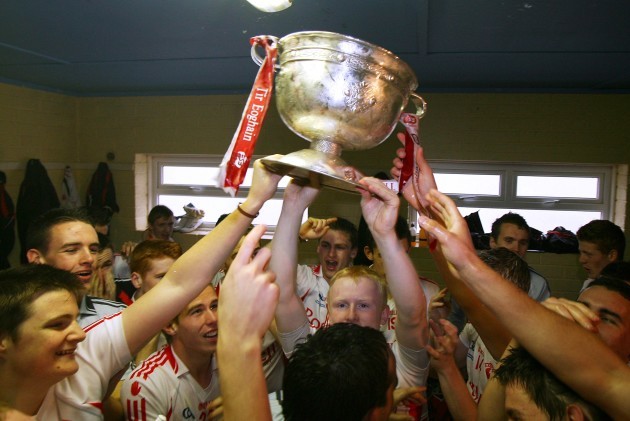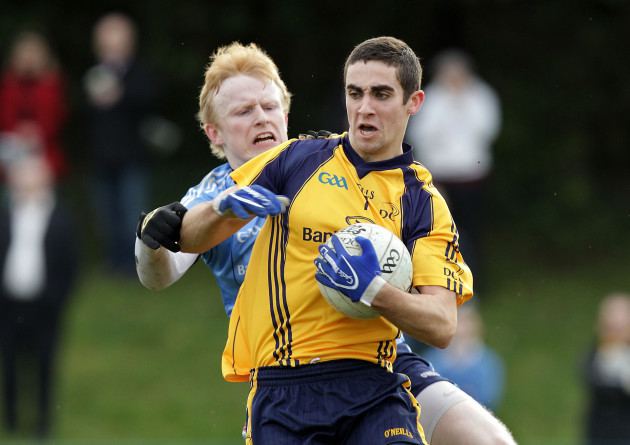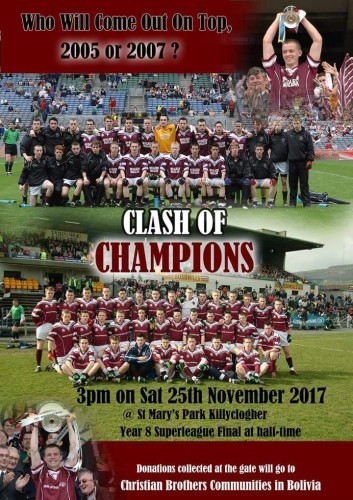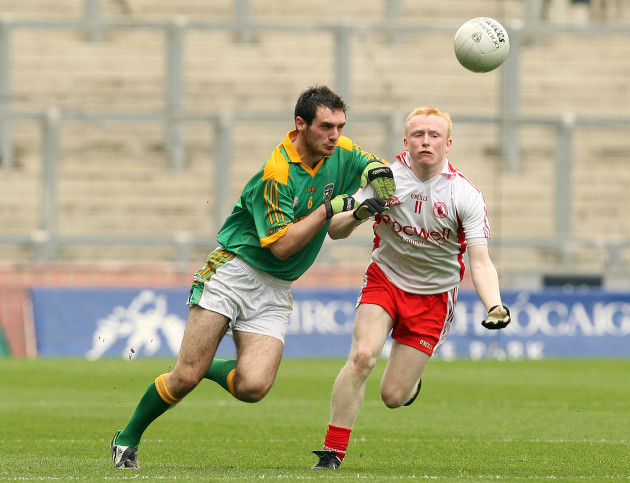IN HIS HOME in Dundee, Diarmaid McNulty clears his Sunday night schedule to allow NFL viewing to take centre stage.
The 27-year-old Tyrone native followed that routine as usual last week but he had another TV programme marked down for later viewing.
A couple of nights later he settled down to take in Alan Shearer’s BBC documentary – ‘Dementia, Football and Me’ – where the former Premier League goal machine shone a light on the sport he adorned and the troubling links between the simple act of heading a football with dementia.
McNulty didn’t need anyone to instruct him on the gravity of the issue.
He knows that amidst the simple pleasure of playing sport, there is always an associated risk of things going wrong.
It’s just over two years since his Gaelic football career ground to a premature halt. Retirement came at the age of 25 after he was concussed for the eighth time and had to admit he needed to prioritise his future well-being.
Here’s how his Gaelic football career was.
It’s a decade since he was pulling the strings in Croke Park and notching 0-3 from play as Omagh CBS lifted the Hogan Cup in style against Tralee CBS.
It’s nine years since he was toasting an All-Ireland minor win in Pearse Park in Longford, centre-forward on a Tyrone side that included Peter Harte and Mattie Donnelly, with opponents Mayo numbering Aidan O’Shea and Robert Hennelly in their ranks.
And it’s six years since he was playing for Tyrone in an Ulster U21 final and Jordanstown in a Sigerson Cup final, losing narrowly on both occasions.
“You couldn’t really dream those underage days up,” reflects McNulty.
“I was on the county panel for three years as a minor and eventually getting to the summit at the third attempt was like a reward for all the hard work. It wasn’t just a one year wonder.
“There were four of us that were there three years and it was nice to finally get to the top. Men from that game that have gone on to represent county teams and Ireland.”
He was a diminutive and jinking presence in half-forward lines, pencilled in as Diarmaid McNulty on teamsheets but more familiar as Riise to everyone who played with him and knew him.
Back in November 2001 John Arne Riise unleashed that thunderbolt free-kick for Liverpool against Manchester United .
The ripple effect from the Norwegian’s strike would bestow a nickname upon a teenager from the small parish of Gortin, just outside Omagh.
“It was about three weeks after that goal,” he laughs.
“We had first year house leagues (in school) and there was a free kick, I’m right footed but I hit it with my left and it went into the top corner. A couple of boys from seventh years nicknamed me Riise and it stuck ever since.
“More people would know me as Riise than Diarmaid. I’m not a Liverpool fan or anything. Messi is my hero, I’ve been over the Nou Camp a couple of times, but if I was picking my English club it would be Leeds United.”
The good times and the golden run of success rolled on for a few years but he had to brace himself to withstand a series of setbacks. The first concussion was suffered in a club championship game back in 2010, the start of seven McNulty incurred in a spell spanning two and a half years.
“It (the first one) was complete accidental, one of these high balls put in when the full-back came and took man, ball and everything.
“The corner-back and corner-forward were involved as well, all three pinged me and it was my head off the ground.
“Looking back that was a sign that GAA didn’t take it seriously. I know that was seven years ago but I was out cold, unconscious. I got up and finished the game.
“Completely ludicrous when you look back now. That was sort of the way it was then. I got another one six weeks later and I sort of put that down to not fully recovering from the first one.”
In 2011 he was struck down again in the midst of Tyrone’s three-game Ulster championship saga with Down.
“In the training between the second and third game, myself and the full-forward and the full-back all collided.
“My tooth sort of ended up in his shoulder, I sort of yanked my jaw out and it was sort of hanging there. But to be fair the only thing that was really sore that time was my ankle more than anything else.
“I drove home and my mum found me (later) unconscious in the house. So that was a bit of a concern.”
He sat out the second replay against Down, returned to face Monaghan but felt not all was right. In the final against Cavan, he was sprung into action and in his efforts to claim the first ball that went his way was struck down when his temple collided with a knee.
After spending the night in the Erne Hospital in Enniskillen, it was time to get properly assessed. Tyrone’s medical staff directed him towards Dr Michael Webb, who works at the Sport Institute in Northern Ireland.
“One of the tests that they did, it was the highest score he’d ever seen for post concussion symptoms.
“He was assessing the likes of Stephen Ferris, boys you see on TV getting big bangs. So with his advice, I took a three month layoff where I did virtually nothing.
“I struggled to even exercise at that stage because there was pains in my head. So that was strange.”
By now McNulty was entering the final year of his degree in Sport & Exercise Sciences in Jordanstown. Concussion was a topic he wanted to explore further and elected to do his dissertation on it.
As part of that he conducted tests on GAA players he knew – those who had suffered concussion and those who had not.
“Shane McCormack, the Kildare goalkeeper, had never been concussed before so he was one of the boys I tested and then he did get concussed playing in the National League with Kildare.
“So six weeks later, I asked him to do the test again and he was 20 seconds slower. To me there was clear evidence.”
At the tail end of 2011 McNulty was concussed once more, this time while in action for Jordanstown. His manager Adrian McGuckin implored him to take a break on the sidelines. At the start of 2012, he emerged refreshed and reinvigorated.
Jerome Quinn / Vimeo
The Dr McKenna Cup became a stage upon which he shone with a series of free-scoring displays and he was central to Jordanstown’s Sigerson Cup campaign before they succumbed to a star-studded DCU team in Galway in February.
He felt in good shape but another pitfall was lurking around the corner.
“About three weeks later I got a concussion in training with the club at home and I started bleeding at different times through the night – through the nose and through the ears.
“I went and got another check up and I made the call that I needed to take another three months to recover. I always felt after the three months that my body was a bit fresher and I’d no real head pains any more.”
He made his comeback in 2012 and life meandered on. In August 2014 he went to Glasgow to further his studies in Strathclyde and after that secured a teaching post in St Paul’s RC Academy in Dundee. He’s still based there now teaching PE and Support Learning.
From the moment he landed in Scotland, the passion and desire to keep playing Gaelic football at home never deserted him. The route back to Gortin at weekends for matches was a well-worn one, flying out of Glasgow when he was in university there and then out of Edinburgh when he was based on the east coast.
In later October 2015, he journeyed home for an intermediate play-off game between Gortin and Urney. He began the match brightly, raising a green flag and sweeping over a couple of points in the first half.
As the action approached half-time, he was battling for possession.
“It was like a double bang, down the side and on the middle of my head,” he recalls of the injury suffered before the break.
“I was 45 minutes lying on the pitch, waiting on an ambulance and then taken to Altnagelvin Hospital in Derry.”
In the aftermath he took stock and reflected on the difficulties he had endured from the concussions.
“After a few concussions, a few family members would have said my personality would have changed. I’d have been laughing at everything, like a child would sitting in a car and reacting to seeing a lorry. My Dad would be wondering what was wrong with me.
“My field of vision was affected. I was regularly getting my eyes tested. My left eye would have been extremely painful, just the strain of light would have brought on a severe headache.
“They gave me a nerve damage tablet, it used to keep me asleep for ages. You’d appreciate it but when you’re young, 22 or 23, you just want to use your energy but I had to use all my energy to recover.
“It was a strange one. The tiredness was unbelievable as well for a couple of years. You’d be having two or three sleeps a day to get through the day, which was completely unlike me.”
In the winter of 2015 he wrestled with the dilemma he faced before finally arriving at a judgement.
It was time to step back permanently.
“I gave it serious thought. I played the sport and gave it everything possible to try to be the best that I could be. It wasn’t a decision I took lightly.
“A few people probably did think I made it a bit too quickly. Within six few weeks of the last concussion, I was thinking that it was time to give myself a break.
“I would have always kept up my research and knowledge of concussions. I knew information would come more public about CTE and stuff like that.
“I made an informed decision with the knowledge that I had which I felt was the correct one. I know certain people would have been disappointed that I did pull the pin but I did it for my own well being.
“I want to make use of my life. There’s more to life and I felt I’d made the right call for myself.”
His family backed him, his parents were his biggest supporters in following his playing exploits but his health had to assume most importance.
His sister Meabh, a nurse in Belfast, had always been someone whose expertise he leaned on in coping when post concussion symptoms cropped up.
But letting go of Gaelic football was never straightforward, not least when his younger brothers Fiachra and Oisin were starting to pin down places on the Gortin adult team.
“The dream would have been for the three McNulty brothers to play together. I played for a couple of years with Fiachra and I did play on Oisin’s debut but that was one of the last games I ever played.
“There’s always a tinge of sadness that we didn’t get to play together more.”
The upshot of that emotive decision has been an improvement in his quality of life. He has had a couple of neurology appointments in Dundee but they’ve been happy with his progress of late and there’s been no need for a recent visit.
“I feel more like myself. I’d say in the last 18 months, I’ve sort of had more better quality of life. There’s still days when I can’t even open my eyes with the pain in my head but they’ve become fewer and fewer.
“The school have been awfully good to me. One time in school I just banged my head off the side of a cupboard and the eyes rolled back in my head and I collapsed.
“The kids panicked and one of them went to get the nurse. They didn’t know what to think because I’d lost consciousness.
“But because the school saw that happen and have heard some of the stories I’ve told, if I’m ever having a bad day, they leave me go home because they know the effects it could have long term. It’s nice when your workplace looks after you that way.”
He watched Alan Shearer’s insightful documentary and was fueled by a desire for a conversation to take hold within the GAA. If he can spark a greater awareness, he feels sharing his story will have been a positive one.
“My biggest thought is there needs to be more research because the sport has changed into a collision sport more than anything. Just look at the physics of it. People are leaner but the speed has increased and the collisions are high impact.
“There’s not one of my concussions that I look back and say that wasn’t as serious a bang as the previous one. They were all pretty heavy duty. It’s hard to say how I could have avoided any of them.
“So one (aim) would be the research and two would be having the strict protocol in place because you’re messing with the health of a man or woman. Everyone wants to see the best players on the pitch but not if it’s to their detriment, you’ve got to remember they’re a human being as well.
“You can create these base lines of cognitive function and different tests that you can do. Basically the player comes off with suspected concussion, does the test and if he’s within a certain percentage of that base line, he can’t come back on. The more exposure and coach education we have the better.
“I think that’s a thing maybe in Irish society, a bang to the head but you’ll be grand. You look at stuff like mental health, if you can’t see it, people think they’re grand. Just because there isn’t a plaster on it doesn’t mean there’s something wrong.
“One of the doctors said to me once you’d be better breaking your leg or your collarbone, at least you’d be given time to heal.
“One of the specialists that I’d seen said that sometimes you might come back and get away with not getting a bang to the head but your reaction are a wee bit slower, you can’t get out of a tackle in time.
“You might blow a knee or an ankle as your own signals aren’t totally firing, which I find quite interesting. All I’m looking for is a wee bit of dialogue to be created. If I could help a couple of people, that’s all that matters.”
He’s coming home next Saturday to lace up his boots one more time on Tyrone soil. The last two Omagh CBS MacRory Cup winning sides will face each other in a charity game, the 2005 crew up against McNulty’s class from 2007.
Everyone will be under instruction not to challenge McNulty when he’s in possession – the same conditions under which he plays the odd game of five-a-side soccer in Dundee. It will feel good to run out in Killyclogher and reminisce with old friends.
These days over in Scotland he plays some rounds of golf and games of badminton but there had been a search for some sporting fulfillment.
That’s where coaching has helped. In St Paul’s Academy, he looks after some of the soccer teams. In nearby Dundee University, he is juggling management roles with the men’s and women’s Gaelic football teams.
And the progress of teams under his tutelage alerted others and he’s been approached to become the Scotland GAA manager for 2018.
“It was probably something I’ve struggled with most, trying to find something else to get the competitive juices flowing. There are times when I’m at home watching the club playing and my two brothers playing, those are the times more than anything you’d love to be back out.
“I would have put on a bit of weight and it would have kept me thinking I wasn’t fit enough to play anyway. Whereas in the last six months, I’ve been getting back more to my proper weight and I think that’s a growing acceptance that there’s more to life.
“Gaelic football runs through my blood. It wasn’t a decision I took lightly to retire but any way I can give back to the sport that I love I try.
“I enjoy the coaching and I enjoy the management. It’s probably something I’ll look to continue to get involved in.
“I do miss playing but I can influence people in a different way now, that’s through coaching and through teaching. In the last six months, I’ve made peace with it. This is where my life is now.
“It’s not about me, it’s about the (concussion) issue itself and looking after the greater wider community in the GAA.
“As much as we play to win, it’s only a game of football at the end of the day. Your health is your wealth.”
The42 has just published its first book, Behind The Lines, a collection of some of the year’s best sports stories. Pick up your copy in Eason’s, or order it here today (€10):
